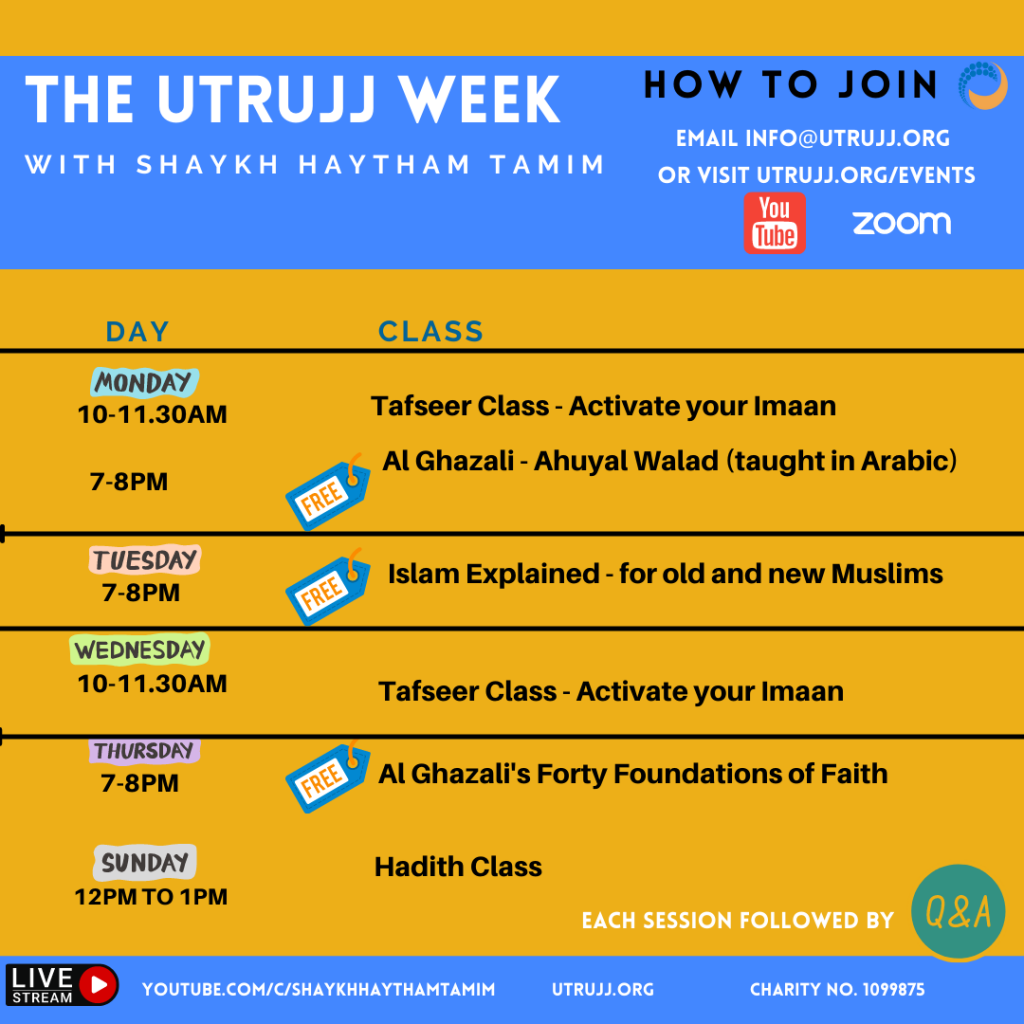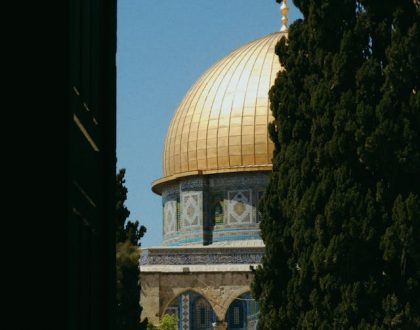Ghazali on remembering death III – aspects of the soul

The People of Allah are disconnected from dunya
On the topic of remembering death, dhikr al mawt, Ghazali talks about the people of Allah – those with gnosis – their state, their connection with Allah and how they perceive death. Such people have deep knowledge of Allah, and devote their time in the remembrance of Allah, so they do not need to be reminded of death because their state is already close to Allah.
By contrast, the rest of us, we need to remember death to cut us off from dunya and remind us of akhirah. The gnostic meanwhile is already in a constant state of remembrance of Allah, his heart is always engaged in dhikr of Allah; though his body lives in the dunya, spiritually he is with Allah. Ghazali is saying this person doesn’t need to be reminded of death, because he is already connected to Allah. Remembrance of death is of no use to him. He is already beyond this. Moreover, fear and hope disappear from his life, because fear and hope are two whips used to bring the servant close to Allah. If he is already close to Allah – he does not require them. Such people are few and far between – they are exceptional cases.
Death disconnects you from dunya. But if you are disconnected then you are already there, you don’t need a reminder.
Al ‘Arif (the knower of Allah) has already died in the sense that he has cut off his relationship with dunya. Dunya is not pre-occupying or occupying his heart. He is like a dead person, in the sense that as he is not attached to the dunya. He fulfils his obligations to his family and financially but he does not let dunya control his heart. Indeed, he is even disconnected from the akhirah because his concern is Allah. His concern is not the akhirah but Allah. The only thing he has not yet experienced is the real death, when the veil will be lifted and the Unseen realm will become the Seen. As Allah Almighty has stated in Surat Qaf:
وَجَاۤءَتْ سَكْرَةُ الْمَوْتِ بِالْحَقِّ ۗذٰلِكَ مَا كُنْتَ مِنْهُ تَحِيْدُ
And the throes of death will bring the truth; that is what you were trying to avoid. [50:19]
لَّقَدۡ كُنتَ فِی غَفۡلَةࣲ مِّنۡ هَـٰذَا فَكَشَفۡنَا عَنكَ غِطَاۤءَكَ فَبَصَرُكَ ٱلۡیَوۡمَ حَدِیدࣱ
“You did not pay much attention to this day, but as We lifted your veil from you, your vision today is keen.” [50:22]
When death arrives, our vision of the Unseen becomes sharp
In the statement of Ali (may Allah be pleased with him), if the veil is lifted his certainty will not increase, but his clarity will. He is already certain of death and the Unseen, but during his lifetime, it they are partially obscured by a curtain – you can see something behind it, but the image is not clear until the curtain is pulled back.
The remembrance of death is necessary for the majority of us as we are not like this and our hearts are attached to this worldly life.
The Knower of Allah doesn’t exhaust his efforts in seeking the dunya. In a narration which is not very strong that Jibril inspired the Prophet (peace be upon him):
Love whomever you want, but you will leave them, live as much as you want, but you will die, and do whatever you want, you will be recompensed with that. [Ayuhal Walad – Ghazali]
Ghazali goes on to state philosophically[i] that you might be longing to know the reality of death, but you will not know the reality of death until you know the reality of life. You will not be able to know the reality of life until you know the reality of the ruh (the spirit) which Allah created and which is hidden and unclear.
وَيَسْـَٔلُونَكَ عَنِ ٱلرُّوحِ ۖ قُلِ ٱلرُّوحُ مِنْ أَمْرِ رَبِّى وَمَآ أُوتِيتُم مِّنَ ٱلْعِلْمِ إِلَّا قَلِيلًۭا ٨٥
And they ask you about the Spirit. Say, “The Spirit is of the Command of my Lord; and in no way have you been brought of knowledge except a little.” [17:85]
All the animate creation of Allah has been given a spirit – humans, Jinn and animals. The soul is from Allah and has been breathed into us in the womb, as mentioned in Surat Maryam. Eesa (peace be upon him) was created by the Word of Allah, kun fa yakun (Be, and it is). Jibril came to Maryam and he blew the spirit into her and Eesa was created. In the hadith, ‘Abdullah bin Mas’ud (may Allah be pleased with him) reported that the Messenger of Allah ﷺ the truthful and the receiver of the truth informed us, said:
وعن ابن مسعود، رضي الله عنه ، قال: حدثنا رسول الله صلى الله عليه وسلم، وهو الصادق المصدوق: “إن أحدكم يجمع خلقه في بطن أمه أربعين يوماً نطفةً، ثم يكون علقة مثل ذلك، ثم يكون مضغةً مثل ذلك، ثم يرسل الملك، فينفخ فيه الروح، ويؤمر بأربع كلمات: يكتب رزقه، وأجله، وعمله، وشقى أم سعيد. ((متفق عليه)) .
“The creation of you (humans) is gathered in the form of semen in the womb of your mother for forty days, then it becomes a clinging thing in similar (period), then it becomes a lump of flesh like that, then Allah sends an angel who breathes the life into it; and (the angel) is commanded to record four things about it: Its provision, its term of life (in this world), its conduct; and whether it will be happy or miserable.” [Bukhari and Muslim]
The soul – the motor that powers the body
No one knows the reality of the soul except Allah. No artificial intelligence can know the reality of the ruh. Scholars in aqeedah mention that because Allah has veiled the reality of the soul from us, we cannot understand it or guess it. It comes from Allah and resides in the body. The light of the soul goes to the eyes, ears hands and heart – giving it sight, hearing, movement and a heart beating. Once the soul departs, the faculties, movements and life of the body go with it. The body shuts down and decays.
Thus the soul is like electricity in the body, and spreads in the body to every single corner and in every atom of the body. It is the motor. Meanwhile, the body is merely the carrier of the ruh, and so the ruh is unaffected by physical sickness, or hunger or medicine. Yet it is affected by how much we control our desires – and is strengthened or weakened by that. We see that most noticeably in Ramadan, that exerting self-restraint over the body, energises and empowers the soul. In Ramadan we focus on what makes us closer to Allah, we put effort in this, and feed the soul with spiritual activity. It is an opportunity to understand how our soul functions.
The soul – the carrier of knowledge and faith
The ruh is so important, we have to look after it. We carry the amanah in our soul. The amanah is our contract with Allah to obey Him, to live and our cognition of Him.
إِنَّا عَرَضْنَا ٱلْأَمَانَةَ عَلَى ٱلسَّمَـٰوَٰتِ وَٱلْأَرْضِ وَٱلْجِبَالِ فَأَبَيْنَ أَن يَحْمِلْنَهَا وَأَشْفَقْنَ مِنْهَا وَحَمَلَهَا ٱلْإِنسَـٰنُ ۖ إِنَّهُۥ كَانَ ظَلُومًۭا جَهُولًۭا
Indeed, we offered the Trust to the heavens and the earth and the mountains, and they declined to bear it and feared it; but man [undertook to] bear it. Indeed, he was unjust and ignorant. [33:72]
The ruh never dies – it comes from Allah and lives forever, while the body dies and returns to dust. The ruh goes onto experience everlasting bliss or everlasting punishment. Ghazali comments that when the body disintegrates into the dust in the grave, neither imaan nor knowledge disappear, for they are carried by the ruh, not the body.
The fisherman’s net – catch knowledge before it’s too late
Death is simply a transformation from one station to another station, but the soul, knowledge, faith and our deeds stay with it. You simply lose control of your body. The grave of the soul is part of Jannah or hellfire. Ghazali is saying that your body is like a fisherman’s net, which you use to capture knowledge. Once you die, you no longer need the net and indeed you feel lighter without it.
Those who did not use their net to catch knowledge, will feel remorse. They will wish they had done more. They will ask for another chance.
أَوْ تَقُولَ حِينَ تَرَى ٱلْعَذَابَ لَوْ أَنَّ لِى كَرَّةًۭ فَأَكُونَ مِنَ ٱلْمُحْسِنِينَ ٥٨
Or say, upon seeing the torment, ‘If only I had a second chance, I would have been one of the good-doers.’ [39:58]
However, there is no return to dunya once you have died. No more chances. You can’t rewind.
Death is like a disease of the body that takes over. The more you are attached to dunya, the harder your departure will be – it will be torture, because all the pleasures of the dunya can only be accessed by the senses. If those were your only pleasures, they will come to an end. You will lose what you loved. Whereas if your soul is connected to Allah, you will feel the lightness of leaving the world. Death removes the barrier between you and Allah, and any attachments that obstructed your connection with Him. This is why death is not a bad thing for those who love Allah.
‘Aishah narrated that the Messenger of Allah ﷺ said:
حَدَّثَنَا يَحْيَى بْنُ خَلَفٍ أَبُو سَلَمَةَ، حَدَّثَنَا عَبْدُ الأَعْلَى، عَنْ سَعِيدٍ، عَنْ قَتَادَةَ، عَنْ زُرَارَةَ بْنِ أَوْفَى، عَنْ سَعْدِ بْنِ هِشَامٍ، عَنْ عَائِشَةَ، أَنَّ رَسُولَ اللَّهِ ـ صلى الله عليه وسلم ـ قَالَ : ” مَنْ أَحَبَّ لِقَاءَ اللَّهِ أَحَبَّ اللَّهُ لِقَاءَهُ وَمَنْ كَرِهَ لِقَاءَ اللَّهِ كَرِهَ اللَّهُ لِقَاءَهُ ” . فَقِيلَ لَهُ : يَا رَسُولَ اللَّهِ كَرَاهِيَةُ لِقَاءِ اللَّهِ فِي كَرَاهِيَةِ لِقَاءِ الْمَوْتِ فَكُلُّنَا يَكْرَهُ الْمَوْتَ قَالَ : ” لاَ إِنَّمَا ذَاكَ عِنْدَ مَوْتِهِ إِذَا بُشِّرَ بِرَحْمَةِ اللَّهِ وَمَغْفِرَتِهِ أَحَبَّ لِقَاءَ اللَّهِ فَأَحَبَّ اللَّهُ لِقَاءَهُ وَإِذَا بُشِّرَ بِعَذَابِ اللَّهِ كَرِهَ لِقَاءَ اللَّهِ وَكَرِهَ اللَّهُ لِقَاءَهُ ” .
“Whoever loves to meet Allah, Allah loves to meet him, and whoever hates to meet Allah, Allah hates to meet him.” It was said to him: “O Messenger of Allah, does hating to meet Allah mean hating to meet death? For all of us hate death.” He said: “No. Rather that is only at the moment of death. But if he is given the glad tidings of the mercy and forgiveness of Allah, he loves to meet Allah and Allah loves to meet him; and if he is given the tidings of the punishment of Allah, he hates to meet Allah and Allah hates to meet him.” [ibn Majah]
Those who love to meet Allah focus their heart, their love and their life on Him. They are ready to leave anytime. They are already and packed. But most of us are not in that position, we are still distracted by the dunya. Your desire to meet Allah is connected to how much you love Him. If you are not that keen on meeting Allah, then you will be less prepared to meet Him.
Allah Almighty says those in Jannah will be given whatever they desire. Yet, we put more effort in attaining the transient, tangible pleasures of this world than the lasting pleasures of the Unseen. It is just a matter of time, patience and submission which would give us access to them. Many of us have seen experiments where children are left with some sweets in front of them and told not to take them until later. The temptation can be overwhelming, but those who manage to resist get a greater reward later. It is about listening to the voice of the divine call, as the bliss of the Hereafter is beyond comprehension.
When the love of Allah is secondary in our lives, we suffer. When you have something competing with the love of Allah and His Messenger (peace be upon him), it is a recipe for a big loss in the akhirah. Therefore, if the only pleasure you get is from dunya then you will suffer a lot. The opposite is the believer whose heart is connected to Allah and has uns with Allah, which is a very deep and close connection with Him. It is experienced during tahajjud and qiyam. The uns with Allah, which you experience in dunya is what prepares you for the akhirah. If you never tasted this uns, you only know the pleasure of eating and drinking but you have tasted nothing of real pleasure. Real pleasure is not food drink and intimacy but connecting with Allah.
The Prophet (peace be upon him), as narrated by Anas bin Malik said:
When any one of you is engaged in prayer, he is holding intimate conversation with his Lord. [Muslim]
This conversation is the real intimacy. What is more beautiful than talking to Allah and listening to Allah’s call. This can only be felt by your ruh.
[i] Ghazali was a great a philosopher and he refuted the arguments of those who denied the existence of Allah in his ‘Refutation of the Philosophers.’
Shaykh Haytham Tamim – Thursday Hadith Class 16th Feb 2023
Related posts
Download your FREE Booklet on Birth and Death Rites in Islam
Download your FREE Booklet on Preparation for Death
What duas can you recite for a good death
Ghazali on contentment (part 1)
Is it OK to cry when someone passes away?
List of prophetic daily adkhar
GHAZALI ON LOVE (PART 2)
https://www.utrujj.org/ghazali-on-love/
[i] Hadith of Gabriel: Angel Jibril came to teach you Islam (abuaminaelias.com)
Umar ibn al-Khattab reported: We were sitting with the Messenger of Allah, peace and blessings be upon him, one day when a man appeared with very white clothes and very black hair. There were no signs of travel on him and we did not recognize him. He sat down in front of the Prophet and rested his knees by his knees and placed his hands on his thighs. The man said, “O Muhammad, tell me about Islam.” The Prophet said, “Islam is to testify there is no God but Allah and Muhammad is the Messenger of Allah, to establish prayer, to give charity, to fast the month of Ramadan, and to perform pilgrimage to the House if a way is possible.” The man said, “You have spoken truthfully.” We were surprised that he asked him and said he was truthful. He said, “Tell me about faith.” The Prophet said, “Faith is to believe in Allah, His angels, his Books, His Messengers, the Last Day, and to believe in providence, its good and its harm.” The man said, “You have spoken truthfully. Tell me about excellence.” The Prophet said, “Excellence is to worship Allah as if you see Him, for if you do not see Him, He surely sees you.” The man said, “Tell me about the final hour.” The Prophet said, “The one asked does not know more than the one asking.” The man said, “Tell me about its signs.” The Prophet said, “The slave girl will give birth to her mistress and you will see barefoot, naked, and dependent shepherds compete in the construction of tall buildings.” Then, the man returned and I remained. The Prophet said to me, “O Umar, do you know who he was?” I said, “Allah and his messenger know best.” The Prophet said, “Verily, he was Gabriel who came to teach you your religion.” [Muslim]
عن عُمَر بْن الْخَطَّابِ قَالَ بَيْنَمَا نَحْنُ عِنْدَ رَسُولِ اللَّهِ صَلَّى اللَّهُ عَلَيْهِ وَسَلَّمَ ذَاتَ يَوْمٍ إِذْ طَلَعَ عَلَيْنَا رَجُلٌ شَدِيدُ بَيَاضِ الثِّيَابِ شَدِيدُ سَوَادِ الشَّعَرِ لَا يُرَى عَلَيْهِ أَثَرُ السَّفَرِ وَلَا يَعْرِفُهُ مِنَّا أَحَدٌ حَتَّى جَلَسَ إِلَى النَّبِيِّ صَلَّى اللَّهُ عَلَيْهِ وَسَلَّمَ فَأَسْنَدَ رُكْبَتَيْهِ إِلَى رُكْبَتَيْهِ وَوَضَعَ كَفَّيْهِ عَلَى فَخِذَيْهِ وَقَالَ يَا مُحَمَّدُ أَخْبِرْنِي عَنْ الْإِسْلَامِ فَقَالَ رَسُولُ اللَّهِ صَلَّى اللَّهُ عَلَيْهِ وَسَلَّمَ الْإِسْلَامُ أَنْ تَشْهَدَ أَنْ لَا إِلَهَ إِلَّا اللَّهُ وَأَنَّ مُحَمَّدًا رَسُولُ اللَّهِ صَلَّى اللَّهُ عَلَيْهِ وَسَلَّمَ وَتُقِيمَ الصَّلَاةَ وَتُؤْتِيَ الزَّكَاةَ وَتَصُومَ رَمَضَانَ وَتَحُجَّ الْبَيْتَ إِنْ اسْتَطَعْتَ إِلَيْهِ سَبِيلًا قَالَ صَدَقْتَ قَالَ فَعَجِبْنَا لَهُ يَسْأَلُهُ وَيُصَدِّقُهُ قَالَ فَأَخْبِرْنِي عَنْ الْإِيمَانِ قَالَ أَنْ تُؤْمِنَ بِاللَّهِ وَمَلَائِكَتِهِ وَكُتُبِهِ وَرُسُلِهِ وَالْيَوْمِ الْآخِرِ وَتُؤْمِنَ بِالْقَدَرِ خَيْرِهِ وَشَرِّهِ قَالَ صَدَقْتَ قَالَ فَأَخْبِرْنِي عَنْ الْإِحْسَانِ قَالَ أَنْ تَعْبُدَ اللَّهَ كَأَنَّكَ تَرَاهُ فَإِنْ لَمْ تَكُنْ تَرَاهُ فَإِنَّهُ يَرَاكَ قَالَ فَأَخْبِرْنِي عَنْ السَّاعَةِ قَالَ مَا الْمَسْئُولُ عَنْهَا بِأَعْلَمَ مِنْ السَّائِلِ قَالَ فَأَخْبِرْنِي عَنْ أَمَارَتِهَا قَالَ أَنْ تَلِدَ الْأَمَةُ رَبَّتَهَا وَأَنْ تَرَى الْحُفَاةَ الْعُرَاةَ الْعَالَةَ رِعَاءَ الشَّاءِ يَتَطَاوَلُونَ فِي الْبُنْيَانِ قَالَ ثُمَّ انْطَلَقَ فَلَبِثْتُ مَلِيًّا ثُمَّ قَالَ لِي يَا عُمَرُ أَتَدْرِي مَنْ السَّائِلُ قُلْتُ اللَّهُ وَرَسُولُهُ أَعْلَمُ قَالَ فَإِنَّهُ جِبْرِيلُ أَتَاكُمْ يُعَلِّمُكُمْ دِينَكُمْ
Related posts
Ghazali on contentment (part 1)
7 traits of a successful believer
Ghazali on 6 levels of truthfulness
Ghazali on showing off (part 3)
Ghazali on showing off (part 1)
Ghazali on how much wealth is sufficient
Ghazali on breaking free from anger
Evils of the tongue 5 – praise
Evils of the tongue 4 – joking
Evils of the tongue 3 – arguing
Evils of the tongue 2- backbiting
The benefits of feeling hunger
Why is following the sunnah the key to success. Ghazali’s secrets part 1
What is wrong with excessive laughter?
Do you have to practice what you preach?
Self righteousness when giving counsel
Brotherhood, friendship and wilayah
How to deal with difficult neighbours
The first 6 rules of how to deal with people
How to deal with people according to their status (9-11)
Cover the faults of others (12-13)
Defend others in their absence, be tactful, be cautious of the company of the rich (16-18)

Recommended Posts

The age old fight between truth and falsehood
April 26, 2024

How Allah strengthens the hearts of believers
April 19, 2024

